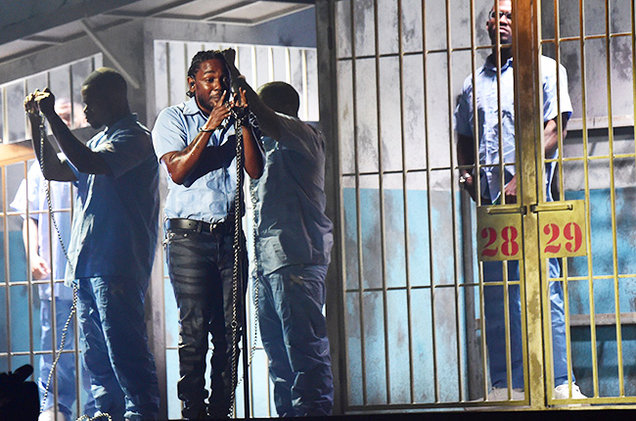
Photo: CBS
Black artists are using high profile events as a platform to discuss race, making some whites uncomfortable. It shouldn’t, because the discussion is overdue
Race is never a comfortable topic.
So often we talk about living in a post-racial society, a society where the color of one’s skin is not mutually exclusive to the content of their character.
Martin Luther King’s Dream.
But this is not the reality. Instead of transcending issues of race, we’ve shoved it in a closet with the hope that it would stay buried underneath the rest of our dirty laundry. And in the process of doing that, new generations grew, many of them never knowing what it meant to hate someone just because of their skin color.
A post-racial society.
When Barack Obama won the White House in 2008, we were told “racism is over”, and yet bigotry only grew. First in subtle ways, and then, when pushed, bigotry exploded. Maybe not with the force of the burning hatred of the ’60s and before, but one could argue that subtle, seething hatred, mixed with outright denial is even more insidious.
So now, in 2016, America finds itself faced with a blown-open closet where racism and bigotry once again paint the room of our collective discussions and people are extra unhappy about it on both sides.
Much of this unhappiness is rooted in frustration and fear. For so long, black Americans have felt voiceless, and with the election of Obama, they’re told that all those past aggressions are now dead and buried. If a black man can be president, then our transgressions are forevermore anchored to the past.
And yet, it endures.
We live in an America that hasn’t been more divided…wait, that’s not true. That’s being dishonest.
When this plea turns to black entertainers and athletes using their given platform to put up a mirror to the ulcerating wounds that are now festering with each incident, instead of understanding, we hear claims of “reverse racism”.
What is true, however, is the fact that our divisions have never been more magnified. It’s one thing to call each other niggers and honkeys in the privacy of our own homes, amongst like-minded people, but now…now through the magic of Social Media, we can see the effects of racism and bigotry played out in living color, and that’s no pun.
We see the murders of Tamir Rice, Eric Garner, Trayvon Martin, Sandra Bland, Michael Brown and so many other black men and women, and they’re sent around the country, around the world with just a keystroke, and instead of a collective THIS IS WRONG, we started to hear how they were wrong.
We blamed the victims in an era where victim shaming is supposed to be anathema. Except, somehow, when it comes to black people.
When this resistance to this disproportionate treatment becomes too much for one community to endure, it turns into #BlackLivesMatter, and instead of collective reflection and sympathy, we start to hear that all lives matter, even though the very idea of having to say that black lives matter means that clearly there is a perception that they don’t matter enough.
Yet some, a growing number of people, see #BlackLivesMatter as black lives matter more.
When this plea turns to black entertainers and athletes using their given platform to put up a mirror to the ulcerating wounds that are now festering with each incident, instead of understanding, we hear claims of “reverse racism”.
And now we’re half way through Black History Month 2016, a month where certain “fair and balanced” news outlets peddle certain black women to decry its very existence, and America is being taken to task during their favorite events, and it’s not going over well…at all.
The match was lit in of January, with Spike Lee and Jada Pinkett Smith publicly boycotting the Academy Awards over lack of diversity, not only in nominations, but in Hollywood as a whole. The reaction was not loud, and largely brushed off as we moved onto more pressing things in the 24-hour news cycle.
As February moved on the discussion focused on the value of Cam Newton as a black quarterback in the Super Bowl, even though there had been other black quarterbacks, yet there hadn’t been a black quarterback quite like Cam, and people were becoming vocal about their distaste of a man who simply wouldn’t bow or bend or capitulate to the demands of a white society that required its black entertainers to be safe and palatable.
And then, the Super Bowl 50 halftime show.
https://youtu.be/-5BPfRHX1SE
Beyonce, one of those black performers who often seems to get the “she transcends race” pass, did a tribute commemorating the formation of the Black Panther Party during her routine, and everything that mainstream America loved and appreciated about their black performer with the flowing blonde hair turned into resentment and in some cases, hatred.
@billboard can we just have music without a band or artist protesting abt something- it's wrong to slam those who buy your music
— Anne Verebely (@AVerebely) February 10, 2016
Beyonce had the whole highway cleared and escorted by police officers yet she still made that little performace of hers at the Super Bowl
— Johnny McCarthy (@maaac_daddy) February 10, 2016
Beyoncé hates police, but I'm willing to bet that didn't stop her from having them escort her to and from her performance. #irony
— Amanda Burton (@AmandaHerod) February 9, 2016
So Beyoncé hates police, but demands a police escort? New found hatred for her. I knew I didn't like her. I support police 100%
— OKballplayer (@coopblack44) February 8, 2016
Beyonce making a public statement against police brutality, something that we all should be opposed to, largely because police brutality is actually something that also transcends race, and yet her performance was not only perceived as anti-police, but also anti-white.
This is where a huge disconnect lies, and it speaks to the idea that we are not in the post-racial society we’d like to think we’re in.
By the time the Grammys aired Monday night, some were already tired of having their noses rubbed in race. For some, the discussion alone was too much, and the hope was that whatever it was Beyonce did at the Super Bowl would calm down enough to let us settle back into our cocoons of avoidance.
And then, Kendrick Lamar took the stage.
Coming on stage in chains, Lamar delivered a forceful message of rage and desperation in verse, and mixed with the imagery, it dropped with all the force of a megaton bomb.
Lamar held up a mirror to all of America during a live telecast which reached millions of people and he called himself a “Proud Monkey” as he lamented the state of black America in his lyrics.
On February twenty sixth I lost my life too
It’s like I’m here in a dark dream
Nightmare, hear screams recorded
Say that it sounds distorted but they know who it was
That was me yelling for help when he drowned in his blood
Why didn’t he defend himself? Why couldn’t he throw a punch?
And for our community do you know what this does?
February 26, 2012 was the date George Zimmerman gunned down an unarmed Trayvon Martin, and as Lamar delivered his performance, he wasn’t indicting white America. He wasn’t demanding white America’s blood. He was simply asking white America to understand and absorb his pain, because his pain is our pain, even if some of us would rather ignore it.
By the time his performance ended, we were singed, we were frozen in the glow of a man who not only used the platform given to him to not beg for mercy, but rather demand for it.
Of course, the cries of reverse racism and hate came out right on schedule.
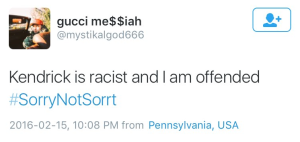
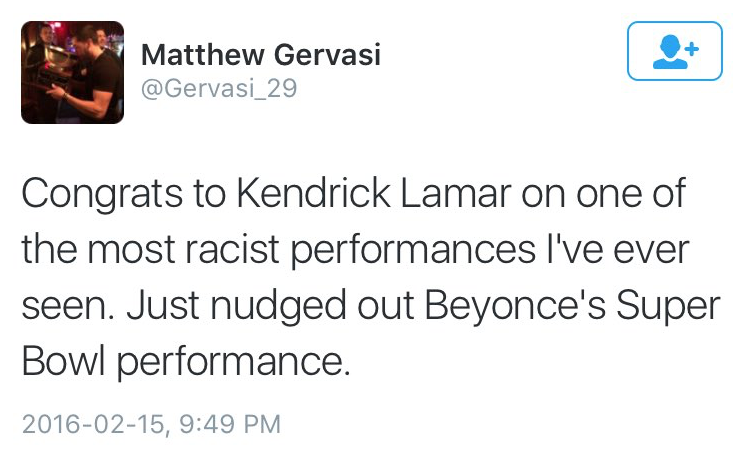
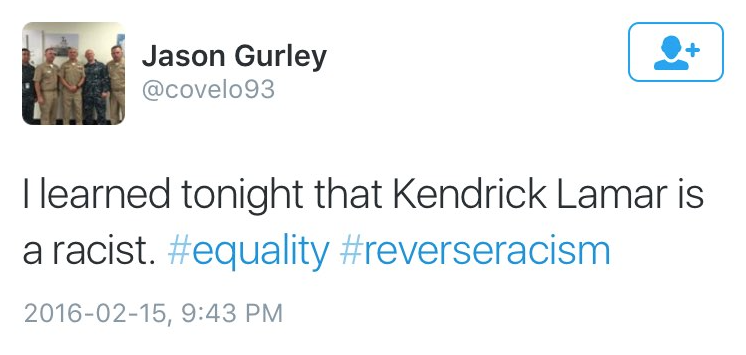
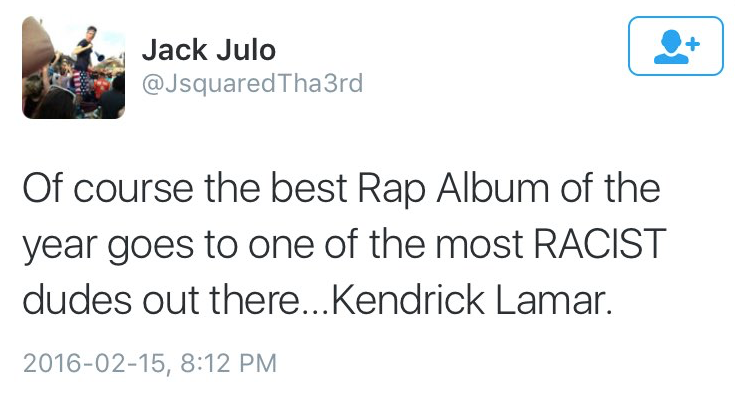
There are white people out there who are so bothered by the very notion of blackness, the very idea that race must be addressed after being ignored for so long that the only way to avoid even having a substantive discussion on race relations in America is to accuse anyone who brings it up as being racist.
It’s this reality that is exactly why we need these performances from Beyonce and Kendrick Lamar. We need the defiance of Cam Newton and sadly we need articles like this to remind everyone that race is not something to be ignored on one hand and used as a weapon on the other.
We are not in a post-racial society because more black men are receiving harsher sentences for first-time offenses.
We are not in a post-racial society because black Americans make less money than white Americans for doing the same work.
We are not in a post-racial society because black Americans don’t have access to the same loans than white Americans.
Most importantly, we are not in a post-racial society because black Americans cannot express their pain without white Americans bristling and calling them racist.
Are white people having the worst Black History Month ever? Probably not. Most of these issues can continue to be ignored, and people can continue to shove these issues back in the closet, but for the sake of all of us, those practices have to come to an end.
The only way for us to truly reach the post-racial society we want to have is to recognize that race matters and that if one of us suffers, society suffers. We are capable of such great feats, such monumental moments, and yet black people feel limited and white people fear retribution.
Coming together, once and for all, means embracing all of our shortcomings and looking ourselves in the mirror to confront our own bigotries and those of our family, friends and co-workers.
If you want performances like we’ve seen in the last month to end, you have to accept why they exist in the first place.
Black lives do matter. So do white lives. But we cannot say that all lives matter until we act like it. The time for avoidance is over.
Hashim R. Hathaway (Uncle Shimbo) is the host of the Never Daunted Radio Network, and proud father to NeverDaunted.Net. You can reach him on Twitter @NeverDauntedNet
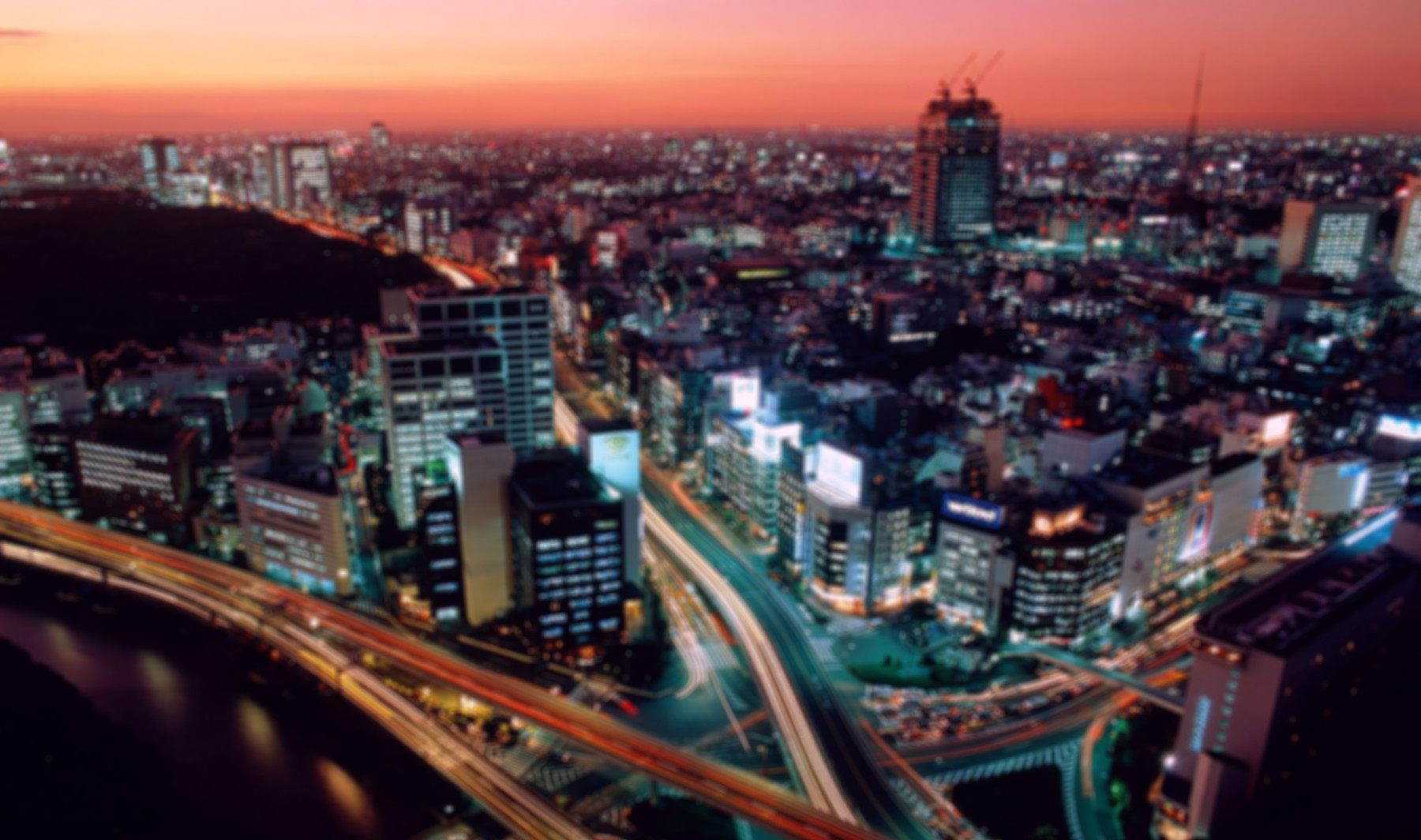
22 Replies to “White People Are Having The Worst Black History Month Ever”